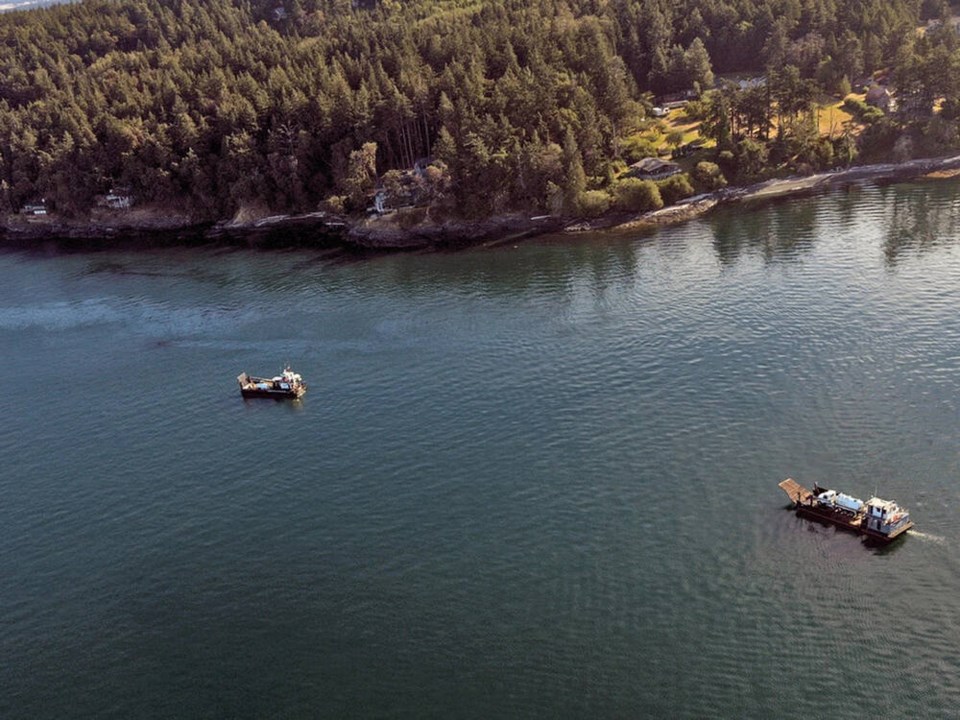Conservation groups are urging the public to report whale sightings along the B.C. coast this weekend as an oil spill from a sunken fishing boat reaches Canadian waters.
Information on the whereabouts of whales in real-time could help prevent the marine mammals, especially endangered southern resident killer whales, from getting caught up in the oil slick.
“There’s only 73 of them left,” said Chloe Robinson, senior manager of conservation impact at Ocean Wise. “If they were to transit in an area where the oil fuel is, it could really affect their health.”
The fishing boat Aleutian Isle sank off the west coast of San Juan Island in Washington State, roughly 25 kilometres east of Victoria, last Saturday, spilling nearly 10,000 litres of fuel.
At the time the vessel sank, 60 out of the 73 endangered whales were reported south of the spill.
The U.S. Coast Guard said Monday that no whales had been identified in the affected area.
On Friday, transient orcas were spotted a few miles away from the site, according to U.S. media reports.
The U.S. Coast Guard said it has “personnel on immediate standby to implement deterrence measures should any whales attempt to approach an area with active sheening.”
The last sighting of southern resident killer whales was last Sunday off the waters plied by the ferry between Washington and Victoria, said Robinson. They were spotted headed west, away from the oil slick, by a group of researchers on the ferry.
But their direction could easily change, Robinson said, and the waters where the boat sank is a key feeding ground for the orcas.
Orcas are not able to avoid oil slicks and are at high risk of inhaling or ingesting the pollutants. Exposure to the oil and toxic vapours can cause skin irritation, internal injuries, and even death.
Robinson said having eyes on the coast is crucial. The plea to report whale sightings isn’t just for boaters on the water, she added. Most of the sightings come from people who are on shore.
Sightings can be reported in real time through the Ocean Wise WhaleReport app, which can be downloaded on a smartphone.
The alert system then broadcasts pertinent details of whale sightings to authorities — including the Coast Guard, Transport Canada and Fisheries and Oceans Canada.
If whales are in danger of being near, or swimming through the oil slick, authorities can use methods including acoustic noises and underwater firecrackers to divert them.
This is one of the first times the app is being used for this purpose, Robinson said. In the past, it had been used mostly to help alert shipping vessels of whale locations to reduce the risk of ship strikes.
“It important to know where marine mammals are in real time in the event there is a petroleum discharge related to the San Juan sunken vessel event,” DFO marine mammal expert Paul Cottrell said in a statement. “This will ensure our team can respond in real time to mitigate exposure
Preventing orcas from swimming into contaminated waters is just one of the steps in dealing with the impact of the oil spill, which could affect salmon, the whales’ main prey, and other marine life.
“Even after the spill is cleaned up, there will be some residual oils, fuels and hydrocarbons that’ll continue to be a threat,” she said. “They won’t be gone the minute the boat is gone.”
The U.S. Coast Guard said Friday evening that it was continuing efforts to remove the sunken vessel from the seafloor and place it on a barge so pollutants contaminants can be safely removed.
“This is the best course of action to ensure the removal of as much pollutants and contamination as possible from the environmentally sensitive area,” it said in a news release.
Contractors were waiting for specialized equipment to arrive, which the coast guard could take several days. Once they are received, dive operations will resume.
— With a file from the Times Colonist





